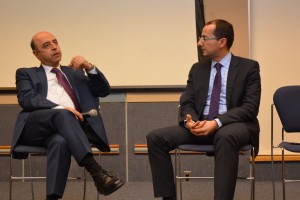- About Ramapo
- Academics
- Admissions & Aid
- Student Life
- Athletics
- Alumni
- Arts & Community
- Quick Links
- Apply
- Visit
- Give
BELEAGUERED CHRISTIAN COMMUNITIES IN THE MIDDLE EAST DISCUSSED
(PDF) (DOC) (JPG)February 11, 2015
 (MAHWAH, NJ) – The Gross Center for Holocaust and Genocide Studies hosted a conversation between Rev. Dr. Paul Haidostian and Khatchig Mouradian on “The Scourge of Genocide: A Century of Angst in the Middle East” on February 10 that drew more than 90 attendees to Ramapo College.
(MAHWAH, NJ) – The Gross Center for Holocaust and Genocide Studies hosted a conversation between Rev. Dr. Paul Haidostian and Khatchig Mouradian on “The Scourge of Genocide: A Century of Angst in the Middle East” on February 10 that drew more than 90 attendees to Ramapo College.
The discussion explored how in the Middle East mass violence since the Armenian Genocide of 1915 has created a culture of anxiety among the region’s Christian communities. While the Islamic State of Iraq and Syria (ISIS) represents the most immediate danger, Middle Eastern Christians today generally see themselves in an existential struggle characterized by almost routine attempts to eliminate their presence in the region. They have seen the formerly robust Christian communities of Iraq, which until the second Iraq war numbered about one million, dwindle to less to less than 250,000 in the face of intimidations, bombings and kidnappings.
While realistically pessimistic about the future in Iraq and Syria, Haidostian sees some measure of hope in Egypt and Lebanon where demographics and more accommodating political culture combined to create a modicum of stability. Still, in his view, the rise of radical and fundamentalist Islam has put Christian communities on watch throughout the region. In this regard, he also felt that Christians and others outside the region have to take a cue from Pope Francis and become more outspoken on the matter. In his own backyard, Haidostian pointed to the efforts of Haigazian University not only to educate Christians in the region, but also to enroll Muslims as a way of building trust between the faiths.
Born in Beirut, Lebanon in 1961, Rev. Paul Haidostian, Ph.D., was appointed in 2002 as president of Haigazian University in Beirut. His appointment followed a nine-year teaching career at the Near East School of Theology in Beirut. He holds a bachelor’s degree in psychology from Haigazian University, a master’s of divinity from the Near East School of Theology, a master’s of theology and a doctorate in pastoral theology from the Princeton Theological Seminary. In addition to his local and international responsibilities in educational, ecclesial and ecumenical organizations, Haidostian teaches, lectures and writes in Armenian, Arabic and English on a wide variety of topics including Armenian identity, ecumenism, youth, social issues, pastoral theology, and Middle Eastern community.
Khatchig Mouradian is the coordinator of the Armenian Genocide Program at the Center for the Study of Genocide and Human Rights at Rutgers University, where he also teaches in the history and sociology departments as adjunct professor. He has also taught at Clark University and Worcester State University. Mouradian was the editor of the Armenian Weekly from 2007-2014. He is the recipient of the Gulbenkian Armenian Studies research fellowship to study the Armenian community in China in the 20th century and is also the recipient of the first Hrant Dink Freedom and Justice Medal (2014) of the Organization of Istanbul Armenians.
E-News Archives
| 2023 | 2022 | 2021 | 2019 | 2018 | 2017 | 2016 | 2015 | 2014 | 2013 | 2012 | 2011 | 2010 | 2009 | 2008 | 2007 |Copyright ©2024 Ramapo College Of New Jersey. Statements And Policies. Contact Webmaster.

Follow Us!